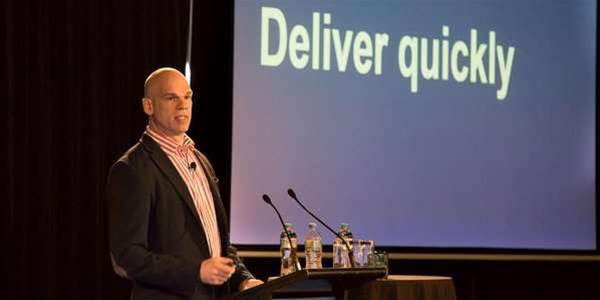The man once hand-picked by former Australian Prime Minister Malcolm Turnbull to lead the county’s digital transformation of public services has savaged new online snooping laws passed last week as vague, unnecessary and detrimental to investment in the local tech sector.

“If you were an outside investor today looking to see if you might want to develop a product in Australia you would think long and hard about whether you would want to do so,” former Digital Transformation Office chief executive Paul Shetler told the ABC’s AM program on Monday.
“Because you could actually have your employees building back doors into your programs without them being able to tell you,” he warned.
The double barreled spray on national morning radio came as both peak technology lobby groups – the Australian Information Industry Association (suppliers) and the Australian Computer Society (users) – held back from issuing a public position on the new laws that passed with support from both the fragile Liberal-led coalition government and Labor Opposition.
Australia’s $100 billion plus tech sector has been left reeling by the passage of the new laws with bipartisan support, moves dovetailed by a foreshadowed crackdown by the nation’s competition regulator the Australian Competition and Consumer Commission on Google and Facebook’s market power, revealed on Monday.
Platforms, including Google and Facebook, are uncomfortably coming to grips with the overtly hostile stance by the government, regulatory and security agencies ahead of Australia’s federal election tentatively slated for May 2016.
Labor is increasingly tipped to win the poll as new Prime Minister Scott Morrison struggles to keep internal factional infighting under control.
However Labor’s acquiescence to the new intrusive cyber laws has also raised internal party hackles that its leader Bill Shorten was unable to call the government’s bluff.
Shetler told the ABC that Labor “got rolled really badly” in relation to the new laws.
He particularly called out the urgency emphasized by the government to pass the new laws before the Christmas break in order to have any effect.
“Nothing is going to happen as a result of passing this law in terms of products being changed or anything else during the Christmas break, there obviously isn’t any time to do that,” Shetler said.
“That was just a rhetorical ploy as far as I can see. And not terribly different to what Tony Blair said back in the run-up to the Iraq war where he was talking about Saddam Hussein having weapons of mass destruction that could hit the UK in 40 minutes.
“It scared the bejesus out of everybody, but of course it was a pack of lies.”
Shetler also criticised assurances over the protection of legitimate encryption as insufficient.
“The government says that it is not back doors, but … the way that they describe what companies can be asked to do is very vague and very open and there’s not any really any real limitations on that.
“They say that you are not supposed to produce any systemic weakness, but when they describe what a systemic weakness is, they talk about an entire class of technology. It is very vague, no one knows what it means in practice.
“Everybody is pretty concerned in the industry that it will in fact involve what amounts to back doors.”
A key concern is whether product created by Australia’s growing software export sector can be trusted.
“You could wind up bringing to market things which might be embarrassing later on. I have already had a person tell me [that they have] decided to pull out of the Australian market,” Shetler told AM.
“The government says that it is not back doors, but … the way that they describe what companies can be asked to do is very vague and very open and there’s not any really any real limitations on that.
“They say that you are not supposed to produce any systemic weakness, but when they describe what a systemic weakness is, they talk about an entire class of technology. It is very vague, no one knows what it means in practice.”
Shetler said tech companies “will find different ways to resist this.”
“They may pull out of Australia. They may decide not to invest in Australia. Some companies are already indicating that that will be what they will do.
“This is really one of the biggest industrial policy experiments ever done. Technology is the future of Australian business. And the government has gone in there and said, hey, you know what, we can make product decisions for you.”


.png&h=140&w=231&c=1&s=0)
_(28).jpg&h=140&w=231&c=1&s=0)
_(20).jpg&h=140&w=231&c=1&s=0)






 iTnews Executive Retreat - Security Leaders Edition
iTnews Executive Retreat - Security Leaders Edition
 iTnews Benchmark Awards 2026
iTnews Benchmark Awards 2026
 iTnews Cloud Covered Breakfast Summit
iTnews Cloud Covered Breakfast Summit
 The 2026 iAwards
The 2026 iAwards












_(1).jpg&h=140&w=231&c=1&s=0)



